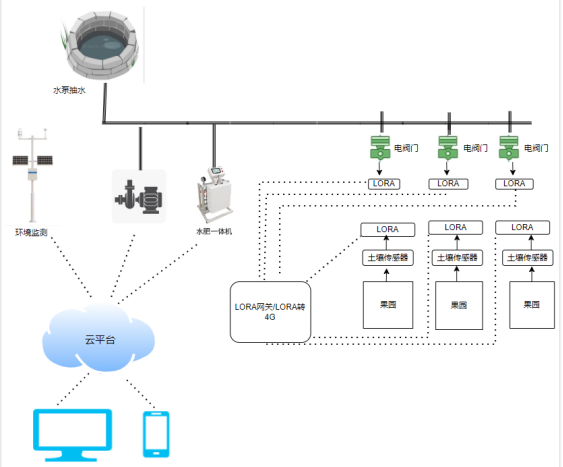






Release time:2025-10-16 Browsed1 order
I. System Architecture
The overall 4G orchard solution mainly consists of four parts: the data collection layer, the data transmission layer,
the data processing layer, and the application layer. Data Collection Layer: A variety of sensors (such as temperature
and humidity sensors, light sensors, soil moisture sensors, pest and disease monitoring devices, etc.) and 4G cameras
deployed in the orchard are used to collect data on the orchard's environmental parameters, pest and disease conditions,
and fruit tree growth status in real - time. Data Transmission Layer: Leveraging the high - speed transmission characteristics
of the 4G network, the collected data is transmitted to the cloud or a remote monitoring center in real - time. At the same time,
it supports remote control and command issuance, enabling the remote operation of orchard equipment. Data Processing
Layer: The received data is processed through cleaning, analysis, and mining to extract valuable information and provide
decision - making support for orchard management. Application Layer: Based on the processed data, various application
functions are developed, such as intelligent irrigation, precision fertilization, pest and disease early warning, video monitoring,
and data analysis reports, to meet the actual needs of orchard management.
II. Main Functions
Intelligent Irrigation: According to the data collected by the soil moisture sensor and combined with the growth needs of
fruit trees, the irrigation volume is automatically calculated, and the irrigation equipment is controlled for precise irrigation,
improving the efficiency of water resource utilization. Precision Fertilization: By monitoring the soil nutrient content with soil
nutrient sensors and combining it with the growth cycle and nutrient requirements of fruit trees, a precise fertilization plan is
formulated to reduce chemical fertilizer waste and improve the quality of fruit products. Pest and Disease Early Warning: Pest
and disease monitoring devices are used to monitor the pest and disease conditions in the orchard in real - time. Once an
abnormality is detected, an early warning is immediately issued, and prevention and control suggestions are provided to reduce
the harm of pests and diseases to the orchard. Video Monitoring: 4G cameras are arranged in the orchard to achieve all - day
and all - round video monitoring, ensuring the safety and stability of the orchard. At the same time, it supports remote viewing
of the real - time orchard images, enabling fruit farmers to keep abreast of the orchard situation at any time. Data Analysis
Report: Regularly conduct statistical analysis on various data in the orchard and generate detailed data analysis reports to
provide scientific decision - making support for fruit farmers. The report content includes, but is not limited to, the changing
trends of environmental parameters, the occurrence of pests and diseases, and the growth status of fruit trees.
III. System Advantages Real - time nature: Leveraging the high - speed transmission characteristics of the 4G network, real - time
data collection, transmission, and processing are achieved, ensuring the timeliness and effectiveness of orchard management.
Precision: Through the application of various sensors and intelligent algorithms, precise orchard management is achieved, improving
the efficiency of resource utilization and the quality of fruit products. Automation: Supports the automated control of agricultural
production such as irrigation and fertilization, reducing labor input and improving production efficiency. Visualization: Provides
visualization functions such as video monitoring and data analysis reports, facilitating fruit farmers to keep abreast of the orchard
situation and make scientific decisions. Scalability: The system architecture is flexible and supports functional expansion and
upgrading according to the actual needs of the orchard.
IV. Implementation Steps Requirement Survey: Thoroughly understand the actual situation and needs of the orchard, and clarify
the system construction goals and functional requirements. Scheme Design: Based on the results of the requirement survey, design
the overall 4G orchard solution, including the system architecture, functional modules, and equipment selection. Equipment
Procurement and Installation: Purchase the required sensors, cameras, control equipment, etc., and carry out installation and
debugging. System Integration and Testing: Integrate various devices with the system platform and conduct functional testing and performance optimization.
